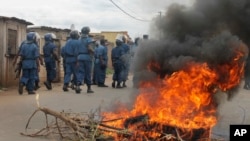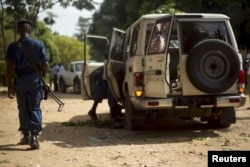There was hope the appointment of a new regional mediator for Burundi, former Tanzanian president Benjamin Mkapa, would jumpstart the peace process; but, talks that were scheduled to start Monday in Arusha have been delayed until later this month. Meantime, arrests, grenade attacks and assassinations continue, and dialogue grows more complicated by the day.
Political mediation for Burundi, scheduled to start Monday, has been postponed. Officials cited the need to consult more with the government and its opponents.
A previous mediation effort led by Uganda's President Yoweri Museveni failed to make progress.
In March, the East African Community (EAC) bloc appointed former Tanzanian President Benjamin Mkapa to lead the talks and help find a solution to the country’s yearlong political crisis.
According to officials familiar with the talks, the government is reluctant to meet with opposition groups who they say are behind attacks on government and security officials.
Government spokesman Willy Nyamitwe said the talks should expand to include opposition groups in exile.
“Political talks are going on in the country because we have a commission that is dealing with inter-Burundian dialogue, but we are willing to continue this dialogue from inside to outside, so we have to go outside and meet other Burundians who cannot make their trip to Burundi,” he said.
The opposition group CNARED, whose members are mostly in exile, have accused the government of blocking them from taking part in the political dialogue.
Amnesty International deputy regional director Sarah Jackson said the delays affect the country's stability.
“We have seen talks delayed time and time again. As it is delayed, it is ordinary Burundians who are suffering, suffering from the economic situation, from increasing polarization and from these high profile assassinations,” she said.
Jackson said violence and human rights abuses are on the rise.
“The last year has been marked by killings, torture, arbitrary arrests and what we have seen in the last couple of weeks is an increase in targeted assassinations or attacks on high-level people from all sides.”
Last week, gunmen killed a top brigadier general along with his wife and bodyguard, an act condemned by President Pierre Nkurunziza.
The head of the CORENABU political movement, Dieudonne Birahinduka, says Burundi needs a change in leadership.
“We do not believe that these are the best people to lead the country. They do not have clean hands. Some of them have got blood in their hands. We believe the country should be in the hands of a new generation of politicians with the help of the International community,” said Birahinduka.
The crisis began last year when President Nkurunziza announced he would seek a third term, a move his critics said was unconstitutional. Nkurunziza won re-election in July, but only after a coup attempt and violent protests.
The United Nations says more than 400 people have been killed and more than 250,000 have fled the country since the crisis began.





